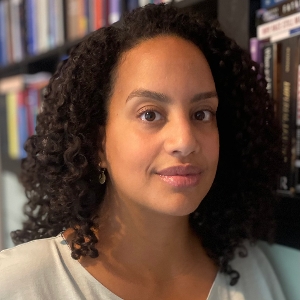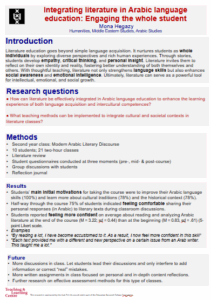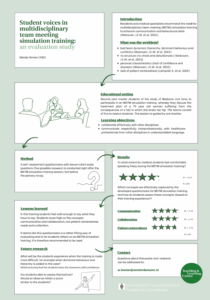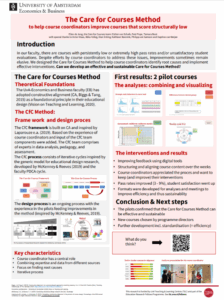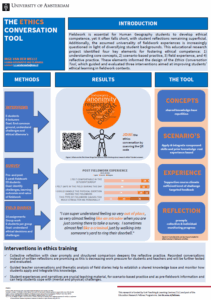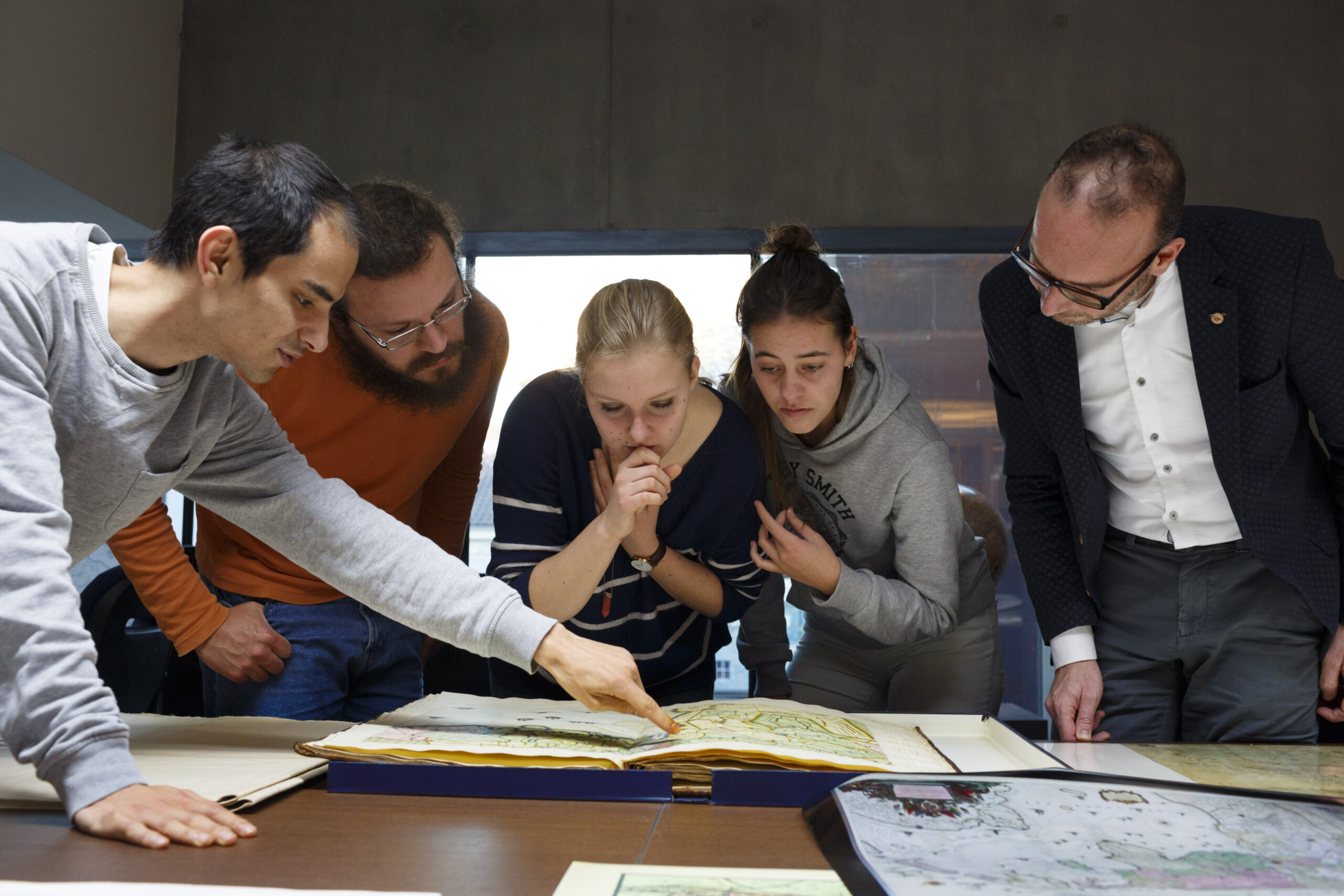
Education Research Fellows Programme 2023-2025
Education Research Fellows | 2023-2025
The Research Fellows who started in September 2023 completed their programmes in June 2025. Information about all the research projects and the fellows can be found below.
Alana Helberg-Proctor | FMG
Teaching ‘Difficult’ Topic
Today’s students are turning the critical lens with which we teach our budding social scientists to look at the world back upon their own education at the UvA to question issues such as social inequality, racism, sexism, ableism, homophobia, environmental injustice, and ‘Western’ academic hegemony. This project explores qualitatively the experiences (central concerns, main grievances, needs and wishes) of students and teachers at FMG related to such ‘difficult’ subjects in academia. Informed by Critical Pedagogy, in this research project, higher education is situated in historical and political context, and the traditional power dynamics of holders of knowledge (teachers) and recipients of knowledge (students) is disrupted.
Dr. Alana Helberg-Proctor is an interdisciplinary social scientist and Assistant Professor in the Health, Care and the Body programme group at the UvA Department of Anthropology. In her work, she focuses on diversity and (in)equality in contemporary and historical healthcare and medical science.
René Glastra van Loon | TLC
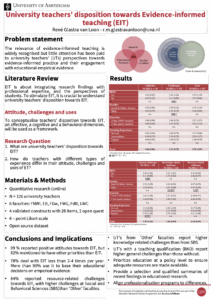
By adopting evidence-informed teaching (EIT), university teachers can enhance their teaching effectiveness, support their professional development, and promote positive student outcomes. Though the relevance of evidence-informed teaching is widely recognised, little is known about university teachers’ perspectives towards EIT and their engagement with educational empirical evidence. Also, certain barriers toward the use of empirical evidence need to be considered. Therefore, to stimulate EIT, it is crucial to understand how university teachers currently perceive the discussion on EIT and what might be obstacles and supportive means to their following of EIT. To this end, an online, qualitative research was conducted among 126 university lecturers (6-point Likert scale).
See UvA profile of René Glastra van Loon
María José Atenas | ACTA
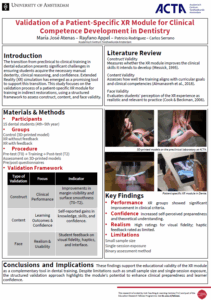
The extended reality training tool, Dente, aims to enhance undergraduate dental students’ transition from preclinical to clinical training, boosting academic performance, confidence, and well-being. Master 1 students will be divided into control and study groups, undergoing initial physical model tests (T0). The study group receives additional Dente training guided by an assessing teacher, while the control group attends regular sessions without Dente. Both groups face a subsequent model test (T1), compared via a rubric. Student self-perception, confidence, and simulator satisfaction will be assessed via questionnaire. Additionally, the simulator’s educational validity will be considered.
Mona Hegazy | FGw
How can we use literature in the language class to achieve a better level of both linguistic and cultural knowledge? What are effective ways of assessment when literature is used in the language class?
Traditional language methods often emphasize grammar and vocabulary, lacking authenticity. Integrating literature offers a more holistic understand of language and culture. I will conduct a literary study. Based on this study texts will selected, and new types of assessments will be tested. Students will be asked to answer a pre- and post- course questionnaire, to evaluate the course and the assessments.
See UvA profile of Mona Hegazy
Wendy Homan | FdG/Amsterdam UMC
Student voices in multidisciplinary team meeting simulation training (an evalutation study)
What: Multidisciplinary team meetings (MDTM) are meetings with healthcare professionals of several disciplines and professions discussing individual patient cases to determine the diagnosis and /or treatment. MDTMs are an opportunity to train the interprofessional skills of healthcare students. Which is, because of the evolving healthcare landscape, very important now. In the master of Medicine, students get MDTM simulation training and have to participate in MDTMs during their clerkships.
We want to investigate the (experienced) teamprocess (do students cross boundaries of their own discipline?), the quality of the diagnosis and treatment and process guidance of the teacher during the MDTM simulation training.
Why: To improve the quality of the training
How: By making audio recordings of the simulation MDTM and using the app Equitymaps, developing questionaries about boundary crossing for the students and set up focusgroups for the teachers and students.
See profile of Wendy Homan via AmsterdamUMC
Ellen de Jong | EB
Care for Courses
Do you know a course with low pass rates or unfavorable evaluations year after year? I bet you do: these are the courses students (you?) have nightmares about. The teacher tried several improvements, but it simply did not work. Frustrating for both teacher and students! Our newly started multidisciplinary Care for Courses team helps the teacher by analyzing the deeper-rooted causes and suggesting promising interventions. The Care team consist of a data analyst, an educational specialist, an assessment specialist and of course the teacher. How to make this multidisciplinary Care for Courses team work effective and efficient? In this research a systemic approach for the Care team is developed and tested.
Maurits de Klepper | AUC
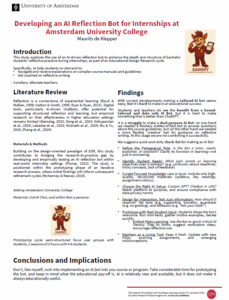
In educational practice, Intensive Longitudinal Methods (ILM) can help to understand and enhance learning experiences. By collecting frequent, real-time data on students’ activities, emotions, and engagement levels, educators gain insights into and intervene in individualized learning trajectories. ILM empowers students to reflect on their learning processes, supports teachers in refining instructional strategies, and aids administrators in shaping institutional policies. Despite its benefits, ILM presents challenges such as data overload and privacy concerns, necessitating careful implementation. Leveraging mobile technology and sophisticated analysis techniques, ILM offers a promising avenue for personalized and responsive education tailored to students’ evolving needs.
Gerda van Roozendaal | IIS
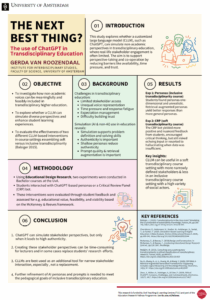
This research studies the meaningful and feasible ways in which non-academic perspectives can be included into higher education. This transdisciplinary integration teaches students how to deal with uncertainties and interests of stakeholders while developing meaningful solutions to societal problems and adds to student’s perspective taking capacities. However, creating linkages between students and outside actors in the context of an educational program is challenging, amongst others because of planning and availability issues. Therefore, in this study a simulation tool will be developed and tested, to be used in courses to mimic a situation to include non-academic voices.
Inge van der Welle | FMG
Fieldwork remains a cornerstone of Human Geography programs, traditionally emphasizing direct engagement with place and face-to-face interactions such as interviews and surveys. This study explores how ethics training within a Human Geography and Planning undergraduate program can be enhanced through research-informed, pedagogically grounded interventions. Four major challenges were identified: inconsistent integration of ethical concepts, limited scenario-based preparation, the mental and physical strain of fieldwork, and underdeveloped reflective practices. In response, this project introduced the Ethics Conversation Tool, designed to scaffold learning across four pedagogical pillars: 1) conceptual understanding, 2) scenario-based practice, 3) field experience, and 4) critical reflection.
Findings show that collective reflection enhances ethical reasoning and helps students meaningfully connect experience with theory. However, students reported that written reflections during fieldwork added undue pressure. As an alternative, recorded conversations are being piloted as a lower-burden reflective format with promising initial feedback.
Nicos Starreveld | FNWI
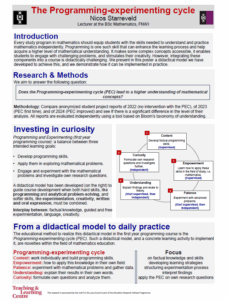
The integration of programming into mathematics curricula has emerged as a promising approach to deepen mathematical understanding and foster independent learning. Programming can engage students with challenging problems, and ignite creativity. However, incorporating programming into mathematics education poses didactical challenges. This study introduces the Programming-Experimenting Cycle (PEC), a didactical model developed to address these challenges and demonstrates its application in a first-year mathematics programming course.
The PEC framework balances three core learning objectives:
1. Developing programming skills.
2. Applying programming to explore mathematical problems.
3. Engaging in experimentation to investigate self-formulated research questions.
Preliminary insights suggest that PEC facilitates deeper engagement with mathematical concepts, promoting analytical rigor and creativity.
Dora Achourioti | AUC
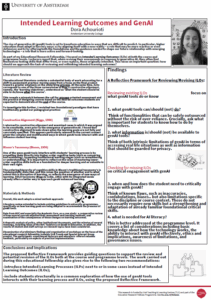
With the rise of generative AI (genAI), higher education is called to align itself with a new reality as well as to offer the foundations and guidance needed for shaping our future relationship with emerging technologies. Lecturers report that, when revising their assessments in response to generative AI, they often find themselves testing skills that differ from, or even replace, those originally intended. This raises an important question: how should we approach the task of reviewing and rethinking intended learning outcomes (ILOs)?
My fellowship research focused on Intended Learning Outcomes (ILOs) and revealed a mismatch: while assessment is shifting from products to processes, ILOs remain product-oriented. Generative AI also challenges constructive alignment and distorts Bloom’s taxonomy, raising questions about how students learn.
To address this, I developed a Reflective Framework with four guiding questions. Based on this, I recommend introducing Intended Learning Processes (ILPs) alongside ILOs, and structurally involving students in exploring how genAI shapes their learning. Future work will adapt the framework across disciplines and translate it into practice.
Dominic Teodorescu | FMG
The Placemaking course at the University of Amsterdam focuses on planning practices at the smallest scale, such as parks, streets, or neighbourhoods. It addresses evolving planning realities and complex societal issues, including environmental, political, and social challenges. Over the past three decades, planning regimes have shifted from top-down policies to public-private partnerships and bottom-up approaches aimed at creating vibrant places. This research proposal explores the role of societal partners in shaping the course and its learning outcomes. It investigates how partner evaluations can be integrated into the assessment of assignments and final grades, addressing the question of transdisciplinary education. The study seeks to understand how partners can be involved in both formulating and evaluating student challenges. Using a mixed-methods qualitative approach, the research aims to provide insights into the dynamics between students and partners, contributing to improved urban spaces and pedagogical practices. Findings will be disseminated through a Placemaking Handbook, a journal article, and conference participation.
This study is still ongoing. The poster and additional information will be shared at a later stage.







